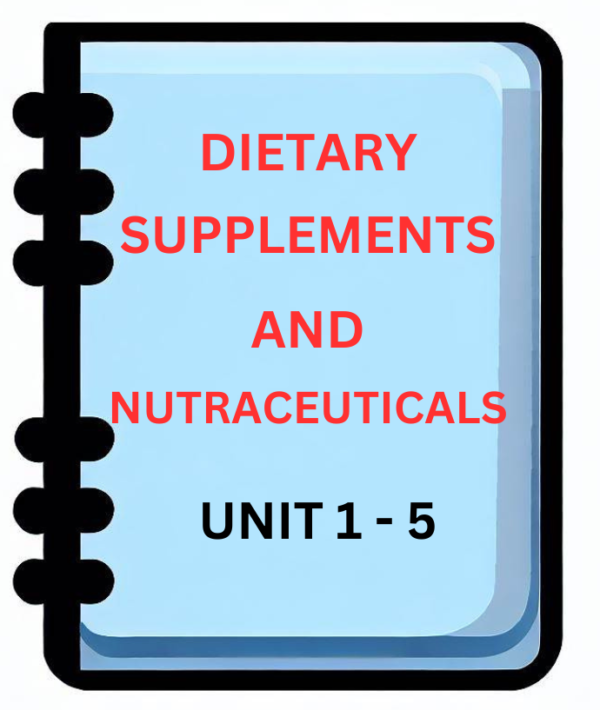
Free Download Dietary Supplements and Neutraceuticals Notes in pdf – Bpharm 8th Semester. High quality and Standard Notes.
Welcome to Pharmdbm.com
Pharmdbm provides standard or well-structured Notes for Bpharm students. The notes are free to download. Each semester notes of Bpharm are available on www.pharmdbm.com.
In this post you can download notes of Dietary Supplements and Neutraceuticals (BP812ET). All units are available to download for free.
Dietary Supplements and Neutraceuticals Notes Unit 1 – 5
UNIT – 1
a. Definitions of Functional foods, Nutraceuticals and Dietary supplements. Classification of Nutraceuticals, Health problems and diseases that can be prevented or cured by Nutraceuticals i.e. weight control, diabetes, cancer, heart disease, stress, osteoarthritis, hypertension etc.
b. Public health nutrition, maternal and child nutrition, nutrition and ageing, nutrition education in community.
c. Source, Name of marker compounds and their chemical nature, Medicinal uses and
health benefits of following used as nutraceuticals/functional foods: Spirulina, Soyabean, Ginseng, Garlic, Broccoli, Gingko, Flaxseeds
UNIT – 2
Phytochemicals as nutraceuticals: Occurrence and characteristic features(chemical nature medicinal benefits) of following
a) Carotenoids- α and β-Carotene, Lycopene, Xanthophylls, leutin
b) Sulfides: Diallyl sulfides, Allyl trisulfide.
c) Polyphenolics: Reservetrol
d) Flavonoids- Rutin , Naringin, Quercitin, Anthocyanidins, catechins, Flavones
e) Prebiotics / Probiotics.: Fructo oligosaccharides, Lacto bacillum
f) Phyto estrogens : Isoflavones, daidzein, Geebustin, lignans
g) Tocopherols
h) Proteins, vitamins, minerals, cereal, vegetables and beverages as functional foods: oats, wheat bran, rice bran, sea foods, coffee, tea and the like.
UNIT – 3
a) Introduction to free radicals: Free radicals, reactive oxygen species, production of free radicals in cells, damaging reactions of free radicals on lipids, proteins, Carbohydrates, nucleic acids.
b) Dietary fibres and complex carbohydrates as functional food ingredients.
UNIT – 4
a) Free radicals in Diabetes mellitus, Inflammation, Ischemic reperfusion injury, Cancer,
Atherosclerosis, Free radicals in brain metabolism and pathology, kidney damage, muscle damage. Free radicals involvement in other disorders. Free radicals theory of
ageing.
b) Antioxidants: Endogenous antioxidants – enzymatic and nonenzymatic antioxidant
defence, Superoxide dismutase, catalase, Glutathione peroxidase, Glutathione Vitamin C, Vitamin E, α- Lipoic acid, melatonin Synthetic antioxidants: Butylated hydroxy Toluene, Butylated hydroxy
c) Functional foods for chronic disease prevention
UNIT – 5
a) Effect of processing, storage and interactions of various environmental factors on the potential of nutraceuticals.
b) Regulatory Aspects; FSSAI, FDA, FPO, MPO, AGMARK. HACCP and GMPs on Food Safety. Adulteration of foods.
c) Pharmacopoeial Specifications for dietary supplements and nutraceuticals.
Bpharm 8th Semester Notes
Biostatistics & Research Methodology
Pharmaceutical Regulatory Science
Quality Control & Standardization of Herbals
Pharmacological Screening Methods
Advanced Instrumentation Techniques
Dietary Supplements & Neutraceuticals
Pharmaceutical Product Development
Scope of Dietary Supplements and Neutraceuticals
This subject covers foundational topic that are important for understanding the need and requirements of dietary supplements among different groups in the population.
Objectives of Dietary Supplements and Neutraceuticals
This module aims to provide an understanding of the concepts behind the theoretical
applications of dietary supplements. By the end of the course, students should be able to :
- Understand the need of supplements by the different group of people to maintain healthy life.
- Understand the outcome of deficiencies in dietary supplements.
- Appreciate the components in dietary supplements and the application.
- Appreciate the regulatory and commercial aspects of dietary supplements including health


